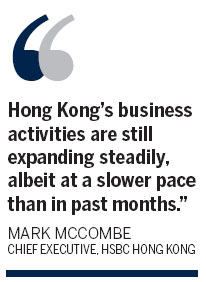Private sector economy expands at slower pace
Updated: 2010-06-04 07:35
(HK Edition)
|
|||||||||
The HSBC Hong Kong PMI shrinks to 53.2 in May, lower than April's
The city's private sector economy expanded for the ninth consecutive month in May, but the pace has slipped since April to the slowest rate in eight months, according to the latest survey by HSBC on purchasing managers.
The slowdown in expansion came as growth in incoming new business from the mainland slowed to the lowest pace in four months and as the euro zone debt crisis clouded the prospect for global economic recovery.
The HSBC Hong Kong Purchasing Managers' Index (PMI), at 53.2 in May, was lower than the 55.3 level of the previous month.
A reading above 50 signals an expansion in the private sector economy and an improvement in business conditions, while a reading below 50 indicates deterioration and contraction.
"Hong Kong's business activities are still expanding steadily, albeit at a slower pace than in past months. This is not a surprise, given the very strong output recorded since the end of last year, combined with recent concerns about ongoing growth momentum in Europe," Mark McCombe, chief executive of HSBC Hong Kong, said when releasing the PMI report.

Supporting the PMI was a further increase in incoming new business. However, the rate of new-order growth has slowed since April, suggesting a weaker improvement in demand. New business received from the Chinese mainland also increased at a slower rate during May, contributing to the overall dip in new order growth.
Nonetheless, the latest increase in new business supported a further expansion in activity, although weaker than in the previous survey period. Backlogs of work at companies in Hong Kong increased, indicating a degree of pressure on operating capacity. However, the accumulation of outstanding business was the slowest in ten months, reflecting the weaker growth in new orders.
In line with increased workloads and output requirements, employment within the Hong Kong private sector increased during May. The rate at which staffing levels rose was modest and slightly weaker than that reported in April.
Firms in Hong Kong indicated a further increase in purchasing activity during May. The pace at which input buying rose contracted from the previous survey period, in line with the slower expansion in activity. Subsequently, suppliers' delivery times lengthened moderately, as the sustained rise in purchasing put pressure on capacity at vendors.
Stocks of purchases increased during the month, suggesting that companies were aiming to rebuild stocks, as well as to fulfill higher current output requirements.
Overall input costs faced by companies in Hong Kong increased markedly during May. Increases in both purchase prices and staff costs drove the overall increase, although the former was the predominant factor. The rate at which overall input costs rose has slowed since April, driven by weaker wage-inflation.
Output prices also increased in May, but at a slower rate, as competition for new business prevented a larger hike in charges.
"We would not expect this to still be the case if demand continues to increase," McCombe said.
China Daily
(HK Edition 06/04/2010 page3)